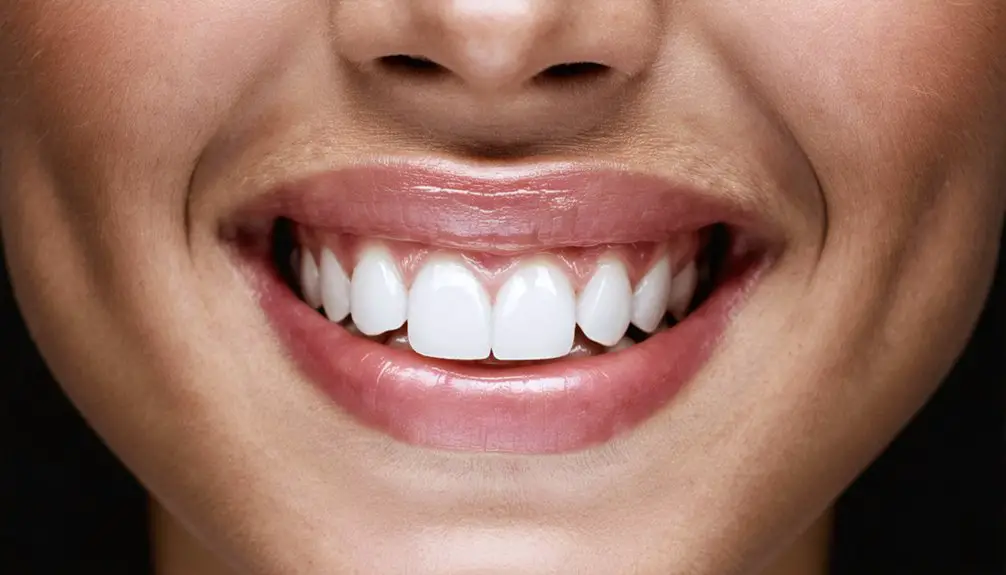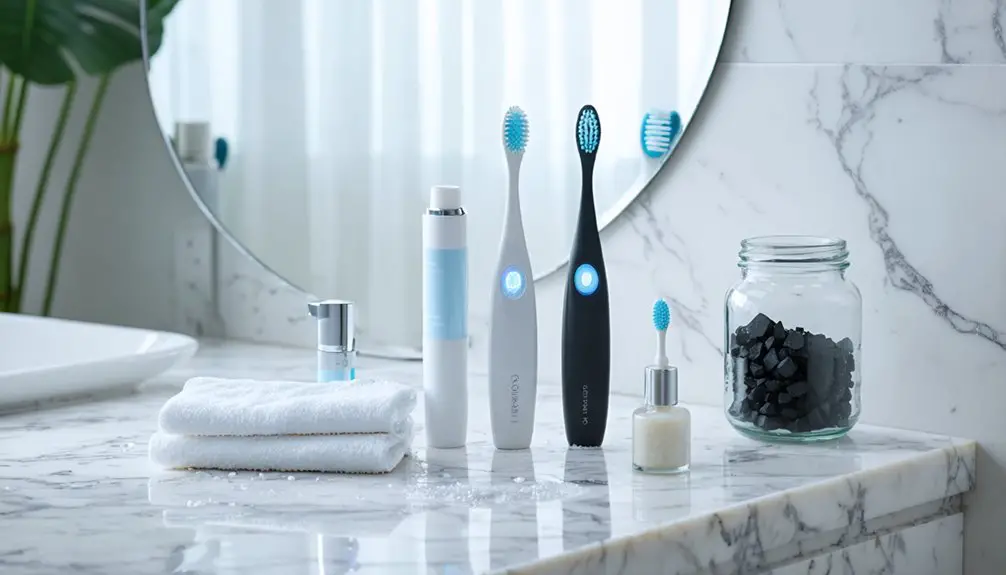Regular teeth whitening enhances both your dental health and psychological wellbeing. Through professional treatments using peroxide-based agents, you’ll remove stubborn stains while promoting better oral hygiene habits. The process not only brightens your smile but also increases your self-confidence and social engagement. With proper maintenance and modern technological advancements, you can achieve long-lasting results that benefit your overall wellness. Understanding the complete science and benefits will maximize your whitening success.
Key Takeaways
- Regular teeth whitening promotes better oral hygiene habits and motivates individuals to maintain consistent dental care routines.
- Professional whitening treatments effectively combat both surface stains and deep discoloration, leading to lasting aesthetic improvements.
- Teeth whitening boosts self-confidence and social interactions by encouraging more frequent smiling and positive personal encounters.
- Consistent whitening maintenance helps protect enamel health through professional monitoring and early detection of potential issues.
- Regular treatments provide optimal results by preventing stain accumulation and reducing the need for intensive whitening procedures.
The Science Behind Professional Teeth Whitening
While teeth whitening may seem like a purely cosmetic procedure, it relies on sophisticated chemical processes and scientific principles.
Professional treatments utilize chemical agents like hydrogen peroxide and carbamide peroxide, which act as powerful oxidizers to break down tooth discoloration at a molecular level.
These whitening compounds work through stain penetration, diffusing through your tooth’s enamel and into the dentin layer.
Once inside, they release reactive oxygen radicals that target both surface-level (extrinsic) and deep-seated (intrinsic) stains.
The process fragments long-chain pigmented molecules into smaller, colorless components that can be naturally eliminated from your tooth structure.
Some in-office treatments enhance this process through activating lights to accelerate results.
The effectiveness depends on factors like peroxide concentration, application duration, and your enamel’s unique permeability, which is why professional supervision guarantees peak results.
For optimal outcomes, treatments often include desensitizing agents to minimize tooth sensitivity during the whitening process.
Health Benefits and Potential Risks
Although teeth whitening offers compelling cosmetic benefits, understanding its health implications requires careful consideration of both advantages and risks.
You’ll find that professional whitening can promote better oral hygiene habits and motivate healthier lifestyle choices. Regular treatments effectively remove external stains while potentially reducing plaque buildup through improved self-care routines. Consulting a dental professional first helps determine your eligibility and creates a personalized treatment plan. Over-the-counter products generally contain lower peroxide concentrations than professional treatments.
However, you must be aware of common side effects. Tooth sensitivity management becomes essential, as bleaching agents can cause temporary discomfort when exposed to temperature changes.
You may experience gum irritation, particularly with at-home treatments. Using custom-fitted trays and following professional guidelines will minimize these risks.
If you have existing dental work or active oral health issues, it’s vital to address these before starting any whitening regimen.
Psychological Impact on Self-Confidence
The psychological impact of teeth whitening extends far beyond mere aesthetics, creating profound effects on an individual’s self-perception and social confidence.
Teeth whitening transforms more than just your smile—it reshapes your self-image and empowers social interactions through enhanced confidence.
When you undergo teeth whitening, you’ll experience a significant self-esteem boost that manifests in enhanced assertiveness and willingness to engage socially. Studies reveal that individuals with whiter teeth smile more, encouraging positive interactions. You’ll find yourself smiling more frequently, which triggers the release of mood-enhancing endorphins and serotonin.
Your brighter smile influences positive social perceptions, as others associate white teeth with success, energy, and good health. This improved dental appearance reduces self-consciousness and anxiety in social situations, enabling more authentic interactions. The process often inspires people to maintain better oral hygiene through consistent dental care practices.
You’ll likely notice increased comfort in professional settings and personal relationships, as your enhanced confidence translates into more effective communication and stronger interpersonal connections.
Long-Term Effects and Maintenance
Regular teeth whitening procedures require careful consideration of their long-term implications and maintenance requirements to achieve lasting results.
While professional treatments can last up to 2-3 years, you’ll need to implement proper maintenance strategies to protect your investment. Combining in-office treatments with prescribed at-home touch-ups greatly extends whitening longevity. Certain medications like tetracycline antibiotics can create deep, stubborn stains that require more intensive whitening protocols. Overuse or improper application of whitening products can lead to enamel erosion.
Enamel protection is vital during long-term whitening regimens. You’ll want to alternate between whitening and enamel-protecting toothpaste to prevent structural damage.
For sensitivity management, use desensitizing products and maintain gentle oral hygiene practices. Schedule regular dental check-ups to monitor your enamel health and maintain professional oversight.
Modern Innovations in Whitening Technology
Recent advancements in teeth whitening technology have revolutionized treatment efficacy and patient comfort through innovative systems and smart solutions.
AI technology now personalizes treatments by adjusting light intensity based on your enamel sensitivity, while nanotechnology applications incorporate hydroxyapatite particles that both whiten and strengthen your teeth. Modern whitening gels now include desensitizing ingredients to maximize comfort during treatment.
LED advancements have enhanced treatment speed by up to 40%, using specific wavelengths to break down stains more effectively. New whitening progress apps help patients track their results through daily photos and artificial intelligence analysis.
You’ll find superior results with custom trays produced through 3D printing, ensuring precise fit and ideal gel distribution.
Plant-based agents, such as PAP, offer gentler alternatives to traditional peroxide treatments, delivering effective whitening while preserving enamel integrity and reducing tissue irritation.
These innovations provide safer, more comfortable, and increasingly personalized whitening experiences.
Frequently Asked Questions
Can Teeth Whitening Treatments Remove Deep Internal Stains From Antibiotics or Injuries?
While teeth whitening can lighten deep internal stains, you’ll likely see only partial improvement for antibiotic effects or injury discoloration. Your dentist may recommend veneers for more severe cases.
How Do Whitening Treatments Affect Existing Dental Work Like Crowns or Veneers?
Your whitening treatments won’t change the color of crowns or veneers, as they’re non-porous materials. While treatments don’t affect their longevity or maintenance, you’ll need new restorations to match whitened teeth.
Is Teeth Whitening Safe During Pregnancy or While Breastfeeding?
While breastfeeding is generally safe for whitening, you’ll want to avoid it during pregnancy due to teeth sensitivity and pregnancy precautions. Wait until after delivery to minimize potential risks to your baby.
At What Age Is It Appropriate to Start Professional Teeth Whitening?
You shouldn’t start professional teeth whitening before age 18, when teeth fully mature. While some consider teenage treatments at 14-16, adult eligibility guarantees safer results with less risk of damage.
Can Certain Medications Interfere With the Effectiveness of Teeth Whitening Procedures?
Yes, your medications can greatly impact whitening results. Antibiotics, antihistamines, and blood pressure drugs can cause resistant stains, while treatment duration and medication types affect your whitening procedure’s overall effectiveness.
References
- https://www.todaysrdh.com/what-the-research-shows-regarding-the-efficacy-of-dental-whitening-options/
- https://pmc.ncbi.nlm.nih.gov/articles/PMC4058574/
- https://www.frontiersin.org/journals/dental-medicine/articles/10.3389/fdmed.2021.687507/full
- https://pmc.ncbi.nlm.nih.gov/articles/PMC6784469/
- https://www.clinicalresearchdental.com/blogs/whitening-hygiene/the-science-behind-teeth-whitening
- https://progrin.com/blog/the-science-and-art-of-professional-teeth-whitening/
- https://www.champaigndentalgroup.org/about-us/blog-articles/how-teeth-whitening-works-the-science-behind-brighter-smiles
- https://www.andrewyapdds.com/blog/the-science-behind-teeth-whitening-how-professional-treatments-work.html
- https://prairiegardendental.com/the-science-behind-teeth-whitening-how-it-works/
- https://narrewarrendentalcare.com.au/risks-of-teeth-whitening-what-you-need-to-know-before-getting-started/



